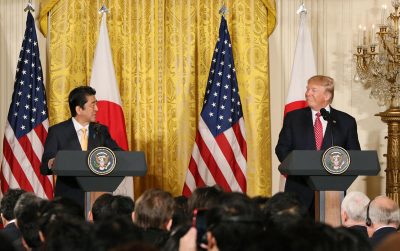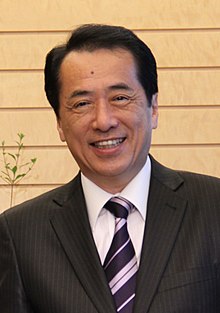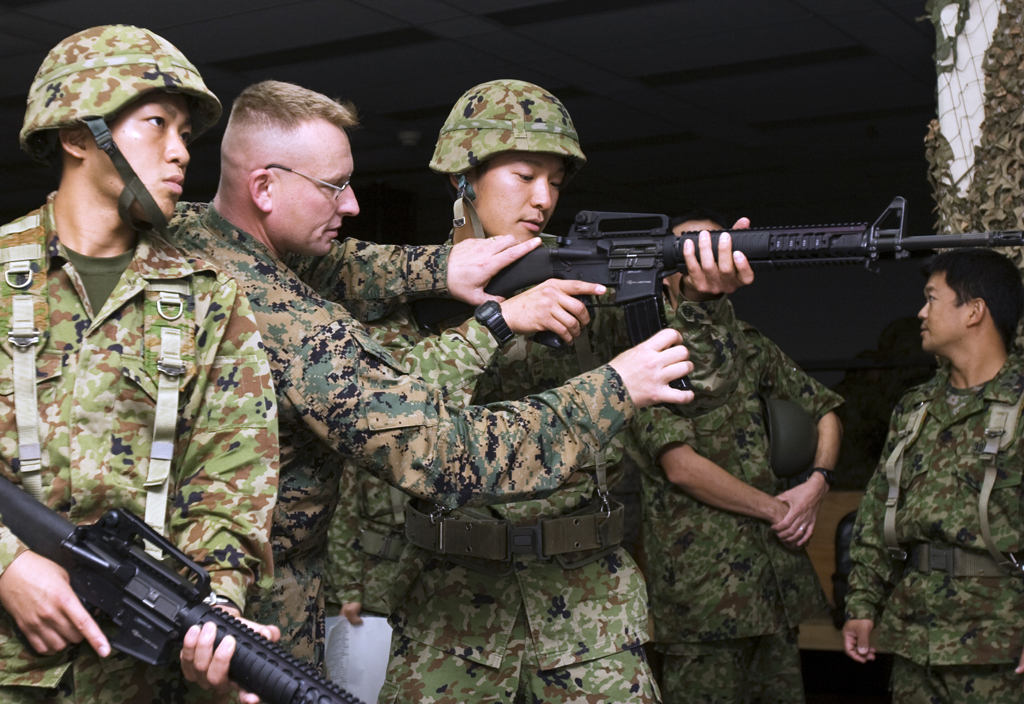When I Came to the U.S. from Japan. The Eyes of “Others” for Us All

For every immigrant, speaking about his or her home country can be somewhat emotional and personal. For us immigrants, the experiences of leaving former identities framed in memories of the land, people, smells, tastes, smiles, laughter, tears and other feelings wrapped in the native tongues and rebuilding our own personhoods in foreign words, foreign-scapes, foreign frameworks held together with the values, beliefs and norms of others gives us a special opportunity to see our world dimensionally. Some of us recognize the mechanisms carefully hidden by the very machination of the social structure. The revelation, at the same time, reveals our essential beings hidden in our former-selves.
When I came to the States as an 18 year old young man, I found out that I was a little Asian man. I met enough people in the small town in West Virginia who didn’t bother to hide their feelings when they recognized me as “other”. Although, I must say that there were also plenty of people who expressed generosity and friendliness to me. In addition, after all, I was one of the privileged Asians – a Japanese.
Japan was nuked twice after the humiliating defeat over the imperial struggle for the Asian hegemony (China and associated interests, etc.) (1) Uncle Sam showed off who the top dog was by incinerating two cities worth of people in Japan. The country was at the brink of extinction. But, Japan, after all, was the most prominent capitalist force in Asia. I think the US made a calculated decision to co-opt the Japanese imperial momentum as its Asian proxy in the most effective way–this, by the way, mirrors what happened to Germany and its Nazi elements as well (2). After the war, the new US backed Japanese regime was given a partnership role in the hegemonic rule of the Pacific nations by the US. The one and only viable political party in Japan, the Liberal Democratic Party, got CIA support along with the Imperial Japanese war criminal leaders guiding its trajectory (3)(4). This was–for the US, as well as for the Japanese corporate power–certainly a better option than Japan having a communist revolution of some sort. The US backed Japanese regime totally went along with the US occupational force, and it did extensive work in demonizing the Japanese imperial trajectory of the past (it must have been easy considering the horrendous things they had done to the neighboring countries) while replacing the momentum with the US made “democracy”, “freedom”, “justice” and so on, which of course operate within the framework of corporatism, colonialism and militarism. The process came with demonization of socialist elements, infiltration of socialist elements, and neutralization of socialist elements. As a result, Japan became a formidable capitalist force backed by the US military might against China and Soviet Union (Russia).
This explains the odd subserviency exhibited by the Japanese here and there. My British friend in Japan, for example, was deeply puzzled by people in Hiroshima welcoming Obama’s visit. However, for the Japanese, Obama is a leader of the “free world”. The fact that he was there to whitewash his engagement in expansion of the US nuclear arsenal, global warmongering and so on and so forth was not a problem to most Japanese people. This tendency can be prominent even among those who vehemently oppose the Japanese rightwing establishment that shamelessly glorifies the imperial Japanese past. Just as president Obama’s kill list and violent colonialism against Libya, Syria and so on didn’t register as criminal to many people in the US. In fact the situation sort of parallels Democratic Party members vehemently demonizing the current Republican president for following colonial, corporate and military initiatives begun by the previous Democratic Party administration.
But in any case, for many who see the enormity of the military might possessed by the US, the monstrosity is a necessary evil against the “bad guys” in the world theater. For many who do oppose the war machine, so called US allies are seen as independent countries with their own self-determination, fully capable of making decisions. Therefore, some of us end up wondering why people in Japan or Germany faithfully go along with the US imperial policies even if that might be contrary to their own interests: Like, going along with sanctions against Russia when they might be losing a productive economic relationship with Russia, or provoking Russia or North Korea even if their own counties might be targets of nuclear attacks. Meanwhile, going along with imperial policies is getting more and more debatable: the imperial hegemony seems to be imploding as it desperately attempts to grow, while China enjoys its spectacular economic success in pursuing a Marxist trajectory in its own way.

There is an interesting anecdote revealing the true nature of the imperial relationship between Japan and the US. When three of the Fukushima nuclear plants caused China syndrome in March 2011, Naoto Kan (image on the right), the Prime Minister at the time, warned other Japanese officials that the US might occupy Japan. The remark allowed some to label him as a clueless moron. However, some of us saw in the remark the real position of Japan within the imperial hierarchy shaped by money and violence in which a “sovereign” country exercises its “free will” at imperial economic and military gun point.
The steep imperial hierarchy that imposes the US military bases in Okinawa (for example), which has been dumping agent orange, depleted uranium, and toxic materials (5) while turning pristine rainforest into a jungle warfare training ground, a military aircraft airport, and a shooting range while also creating the grave threat of nuclear war against South Korea, Japan, Europe and so on, extends right onto the US soil as well. The very population that have allowed the empire to grow so much endure mass incarceration, police violence, massive unemployment, blatant lack of social safety nets, poverty, health crisis, education crisis and so on. But the imperial mind trick somehow renders their powerlessness less visible than the powerlessness of the Japanese people or the German people perhaps. An extraordinary case that illustrates my point deals with the USS Reagan aircraft carrier, which was heavily irradiated by radiation plume from the Fukushima disaster. The sailors suffering from radiation diseases have been abandoned by the US government as well as the Japanese government (6). Within the imperial hierarchy, common men and women are powerless and disposable regardless of their nationalities.

JGSDF soldiers at Camp Kinser (Source: Wikimedia Commons)
If the current build up of the US economic/military pressure against pacific countries continues, and if Japan keeps serving its role with re-militarization, the relationship between the US and Japan can more prominently exhibit a neo-colonial relationship. In this scenario, Japan would play an armed guard dog of the empire against China, Russia and so on, while giving an impression that the violence that emerges should be blamed solely on the evil Japanese regime that would surely come to the fore. This gives the US an opportunity to act as the good cop who engages in whatever is necessary to bring about a “peace”–a “peace” under the western capitalist hegemony. Japan can be Asia’s Israel. And Asia can be the Middle East 2.0.
Regardless, militarization will prolong the life of the western war economy while continuing to delegitimize its authority. The illegitimate force will need a bit more iron fist to keep the whole thing in line. The death spiral that devours the capitalist hegemony will exacerbate the hardship of the people in the west while continuing to mess with the rest of the world.
Maybe I’m letting my imagination fly too wild. But as I said, I felt the imperial arrogance of Japan within the framework of western imperialism as I went through the process of perceiving my existence within the larger framework of the global hierarchy. I do not like the dynamics at all. I want the people of Asia stop being a part of the imperial hierarchy. I want the people of Asia to work together to create environment to free their potential in living harmoniously with each other and with the environment.
Every struggle of a people is connected to struggles of others, and each struggle is unique according to their predicaments. For that reason, we must not keep our eyes off of the larger framework of global capitalism and its contradictions. We must not impose the imperial framework onto people of other countries.
I do know that it is much easier to say than to live according to such a perspective. When I see my fellow Asian people or any immigrant bending so far backward to kiss a nefarious backside of the establishment, I feel their urgent need to be accepted in the hierarchy of money and violence.
But still, I desperately feel the need to share what I learned through the eyes of an immigrant. The emotional and personal part of my story also stems from the fact that I could not adjust to the highly structured Japanese atmosphere when I was growing up. I particularly remember the regular corporal punishments I received at school. I developed an extreme aversion toward the authoritative tendency. The process of shedding my former-self slowly taught me how foreign elements can be removed and destroyed within an authoritative hierarchy by imposing obedience or self-destruction. As a young man I chose self-destruction by alcoholism. This continued until I found my expression in art. My studio practice also led me to understand the bits and pieces holding together to show me the larger picture of what I went though as I moved to a different society. Without this experience, I might have followed a different path.
Anyone in the imperial hierarchy can become “other”. I believe our experience as “others” might perhaps inform the true nature of the capitalist hierarchy for those who have a hard time seeing it. After all we are but one species struggling to save ourselves from our collective predicament of the threat of extinction.
*
Hiroyuki Hamada is an artist. He has exhibited throughout the United States and in Europe and is represented by Bookstein Projects. He has been awarded various residencies including those at the Provincetown Fine Arts Work Center, the Edward F. Albee Foundation/William Flanagan Memorial Creative Person’s Center, the Skowhegan School of Painting and Sculpture, and the MacDowell Colony. In 1998 Hamada was the recipient of a Pollock Krasner Foundation grant, and in 2009 and 2016 he was awarded a New York Foundation for the Arts Fellowship. He lives and works in New York.
Notes
(1) The War Was Won Before Hiroshima—And the Generals Who Dropped the Bomb Knew It
Seventy years after the bombing, will Americans face the brutal truth?
https://www.thenation.com/article/why-the-us-really-bombed-hiroshima/
(2) In Cold War, U.S. Spy Agencies Used 1,000 Nazis
https://mobile.nytimes.com/2014/10/27/us/in-cold-war-us-spy-agencies-used-1000-nazis.html
(3) Nobusuke Kishi
https://en.m.wikipedia.org/wiki/Nobusuke_Kishi
(4) C.I.A. Spent Millions to Support Japanese Right in 50’s and 60’s
(5) Okinawa: the junk heap of the Pacific
Decades of Pentagon pollution poison service members, residents and future plans for the island
(6) Injustice At Sea: the Irradiated Sailors of the USS Reagan

